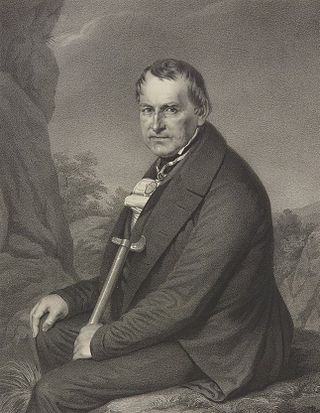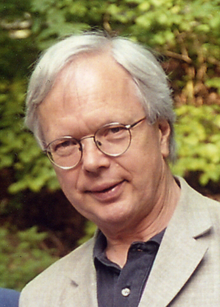
Friedrich Wilhelm Christian Karl Ferdinand von Humboldt was a German philosopher, linguist, government functionary, diplomat, and founder of the Humboldt University of Berlin. In 1949, the university was named after him and his younger brother, Alexander von Humboldt, a naturalist.

Friedrich Wilhelm Heinrich Alexander von Humboldt was a German polymath, geographer, naturalist, explorer, and proponent of Romantic philosophy and science. He was the younger brother of the Prussian minister, philosopher, and linguist Wilhelm von Humboldt (1767–1835). Humboldt's quantitative work on botanical geography laid the foundation for the field of biogeography, while his advocacy of long-term systematic geophysical measurement pioneered modern geomagnetic and meteorological monitoring. Humboldt and Carl Ritter are both regarded as the founders of modern geography as they established it as an independent scientific discipline.

Integrated geography is where the branches of human geography and physical geography overlap to describe and explain the spatial aspects of interactions between human individuals or societies and their natural environment, these interactions being called coupled human–environment system.

Berthold Karl HölldoblerBVO is a German zoologist, sociobiologist and evolutionary biologist who studies evolution and social organization in ants. He is the author of several books, including The Ants, for which he and his co-author, E. O. Wilson, received the Pulitzer Prize for non-fiction writing in 1991.

Christian Leopold von Buch, usually cited as Leopold von Buch, was a German geologist and paleontologist born in Stolpe an der Oder and is remembered as one of the most important contributors to geology in the first half of the nineteenth century. His scientific interest was devoted to a broad spectrum of geological topics: volcanism, petrology, fossils, stratigraphy and mountain formation. His most remembered accomplishment is the scientific definition of the Jurassic system.

The Bavarian Academy of Sciences and Humanities is an independent public institution, located in Munich. It appoints scholars whose research has contributed considerably to the increase of knowledge within their subject. The general goal of the academy is the promotion of interdisciplinary encounters and contacts and the cooperation of representatives of different subjects.

The Bridgewater Treatises (1833–36) are a series of eight works that were written by leading scientific figures appointed by the President of the Royal Society in fulfilment of a bequest of £8000, made by Francis Henry Egerton, 8th Earl of Bridgewater, for work on "the Power, Wisdom, and Goodness of God, as manifested in the Creation."

The Göttingen Academy of Sciences is the oldest continuously existing institution among the eight scientific academies in Germany, which are united under the umbrella of the Union of German Academies of Sciences and Humanities. It has the task of promoting research under its own auspices and in collaboration with academics in and outside Germany. It has its seat in the university town of Göttingen. Its meeting room is located in the auditorium of the University of Göttingen.

The Berlin-Brandenburg Academy of Sciences and Humanities, abbreviated BBAW, is the official academic society for the natural sciences and humanities for the German states of Berlin and Brandenburg. Housed in three locations in and around Berlin, Germany, the BBAW is the largest non-university humanities research institute in the region.
Metabiography is the literary study of the relation of biographies to the temporal, geographical, institutional, intellectual or ideological locations of their writers. It is a hermeneutics of biography that sees the biographical subject as a collective construct of different memory cultures, proposing an essential instability of historical lives. In the words of Steven Shapin, metabiography stresses “that shifting biographical traditions make one person have many lives,” none of these necessarily more real than any other, because all are “configured and reconfigured according to the sensibilities and needs of the changing cultural settings.” In this sense, metabiography expresses a belief in the observer-dependence of historical knowledge.
Jörg Rüpke is a German scholar of comparative religion and classical philology, recipient of the Gay-Lussac Humboldt Prize in 2008, and of the Advanced Grant of the European Research Council in 2011. In January 2012, Rüpke was appointed by German Federal President Christian Wulff to the German Council of Science and Humanities.
Friedrich Wilhelm Karl Ritter von Hegel was a German historian and son of the philosopher Georg Wilhelm Friedrich Hegel. During his lifetime he was a well-known and well-reputed historian who received many awards and honours. He was one of the major urban historians during the second half of the 19th century.
The Göttingen Faculty of Theology is the divinity school at the University of Göttingen, officially denominated the "United Theological Departments" but commonly referred to as the "Theological Faculty" . It was instituted at the foundation of the University, in 1737, along with the three other original faculties of Law, Medicine, and Philosophy. Over the centuries, the Göttingen Faculty of Theology has been home to many influential scholars and movements, including the rise of historical criticism, Ritschlianism, the History of Religions School, and Dialectical Theology. Its members were also involved in the Göttingen school of history.

Moritz Epple is a German mathematician and historian of science.
Peter Richard Schreiner is a German chemist who is a professor at Justus Liebig University Giessen. As of 2022, his h-index is 73.
Marina V. Rodnina is a German biochemist.
Ulrich Aloysius Konrad is a German musicologist and professor at the Institute for Music Research of the University of Würzburg. He is considered an expert on European music of the 17th to 20th centuries, especially the works of Mozart, Robert Schumann, Richard Wagner and Richard Strauss. He wrote a biography, Wolfgang Amadé Mozart, and studied the composer's sketches.
Regine Kahmann is a German microbiologist and was Director at the Max Planck Institute for Terrestrial Microbiology in Marburg from 2000 to 2019. She was made a Foreign Member of the Royal Society (ForMRS) in 2020.
Dirk Görlich, born October 18, 1966, in Halle (Saale) of Germany, is a German biochemist. He is now director at the Max Planck Institute for Multidisciplinary Sciences in Göttingen.

Cothenius Medal is a medal awarded by the German National Academy of Sciences Leopoldina for outstanding scientific achievement during the life of the awardee. The medal was created to honour Christian Andreas Cothenius, who was the personal physician to Frederick the Great. In 1743, Cothenius became a fellow of the Leopoldina, later president of the learned society that had been created by Emperor Leopold I. When Cothenius died, he left a sum of money in his will to the society with the condition that the interest on the money should be used to award a gold medal, every two years by answering a question in medicine whereby some new truth could be established. Up until 1864, the award came with a prize but was then converted into an award for the promotion of research over the whole period of a person's life. Each medal bears the Latin inscription "Praemium virtutis salutem mortalium provehentibus sancitum".











